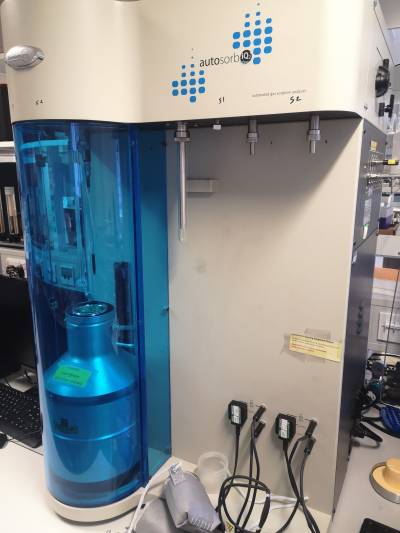This Physisorption analyser can be used to run gas absorption experiments on CO2, Argon or N2.

Instrumentation
Autosorb iQ MP physisorption is used for determination of the specific surface area, active area, pore volume, and pore size distribution of both micro and mesoporous solids. It is capable of measuring pore size distributions down to 0.35 nm and determining specific surface areas below 0.01 m2/g.
Our current set up is Argon physisorption for both microporous and mesoporous materials studies. This is particularly suitable for analysing pore features on zeolite and MOF materials.
A typical physisorption analysis starts with degassing of the sample. The desired protocol of heating rates, hold times and automatic testing are loaded, and then the iQ takes over. After completing the timed protocol, or sooner if the residual pressure rise passes the user defined test limit, the iQ shuts down the degasser, backfilling the sample cell or leaving it under vacuum if preferred.
Comprehensive physisorption calculations include specific surface area (single and multi-point B.E.T., Langmuir, STSA, t-plot, alpha-s, DR), pore size (BJH, DH, DA, MP, HK, SF, Monte-Carlo, NLDFT, QSDFT) with their corresponding surface area values, Kr-pore size for thin films, heats of adsorption, plus NK and FHH fractals. The DFT library is the most extensive available commercially; no less than twenty three mathematical models describing different pore shapes, chemical nature of the surface and specific adsorbate and temperature pairs.
Application
Highly detailed, precise and accurate measurements to characterize the structure and improve the properties and performance of microporous materials such as zeolites, activated carbons, novel carbon structures (nanotubes, bulk graphenes), MOFs, carbon- and silica-based materials with hierarchical micro-mesopore structure (e.g., CMKs), molecular sieves, new materials for gas storage, improved fuel cells and batteries, membranes, nanofilters, etc., with Kr capability being ideally suited for APIs, thin films, nanosized ceramic and metal powders, and the like.
For more information contact Dr Han Wu by Email: han.wu@ucl.ac.uk or by Tel: +44 (0)20 7679 0491.
 Close
Close

